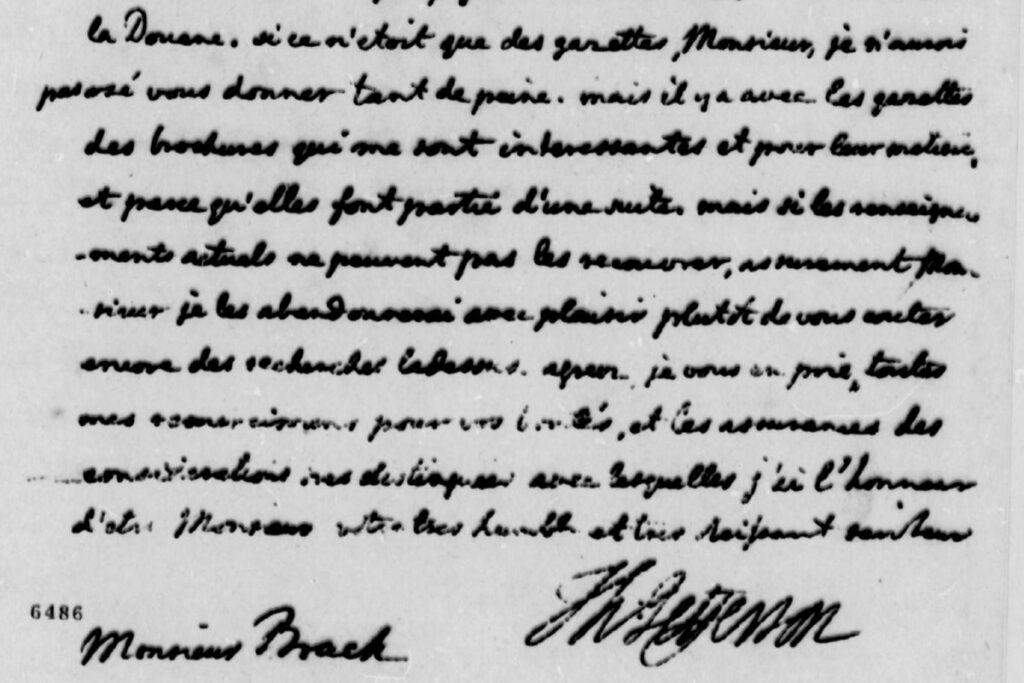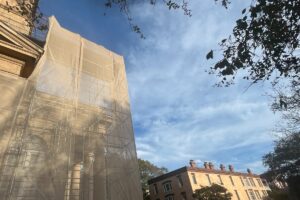STATEHOUSE REPORT | ISSUE 23.46 | Nov. 15, 2024
BIG STORY: S.C. GOP agenda focuses on tax cuts, vouchers
MORE NEWS: Fund has major scholarship expansion
LOWCOUNTRY, Ariail: Who let the monkeys out?
BRACK: Going down a rabbit hole of Jefferson’s past
SPOTLIGHT: The S.C. Education Association
MYSTERY PHOTO: Wooden walkway
FEEDBACK: So move away
Statehouse GOP agenda focuses on tax cuts, vouchers

By Jack O’Toole, Capitol bureau | After a red wave election that handed South Carolina Republicans virtually unchecked power in all three branches of state government, the question for GOP leaders is clear: What do they plan to do with it?
And while no detailed policy proposals are yet available, Gov. Henry McMaster and GOP leaders in the Statehouse began laying out their top priorities in a series of post-election press conferences and statements this week — priorities that state Democrats acknowledge they’re powerless to block.
“There’s no system of checks or balances right now and that’s unfortunate,” former S.C. Democratic Party Chairman Trav Roberts told the City Paper. “Our system was designed to allow for majority rule while also protecting the minority, and that’s just gone.”
But conservative activists, led by the hard-right S.C. House Freedom Caucus, say Republicans have a duty to deliver on the mandate voters gave them.
“President Trump’s winning message, which is shared by the S.C. Freedom Caucus and voters alike, is to cut taxes, improve our infrastructure, decrease regulation and spending, shrink the size of government, protect individual rights and end the woke mind virus which has infected our institutions of higher learning and government schools,” Freedom Caucus members said in a social media post. “We challenge our colleagues in the now expanded super-majorities in both chambers to listen to the people, and lead boldly on these issues.”
The GOP agenda … so far
![]() Though still a work in progress, the updated agenda sketched out by party leaders would represent a major step toward meeting those Freedom Caucus demands.
Though still a work in progress, the updated agenda sketched out by party leaders would represent a major step toward meeting those Freedom Caucus demands.
School vouchers: After seeing school voucher plans struck down twice in the S.C. Supreme Court, Republicans believe the new, more conservative court majority will be more open to the idea. The legislative sticking point in the coming session is likely to be eligibility. At issue: Income. The House GOP supports a voucher program that’s open to all parents regardless of income, while Senate Republicans favor one that’s at least initially aimed at families in poverty.
More income tax cuts: Under current law, S.C. is set to continue to cut its top income tax rate in 0.1% increments over the next two years — from 6.2% to 6.0%. But in a Nov. 6 letter to members, House Republican leaders said it was time for S.C. to go much further — specifically to “reduce our income tax rate to below that of our neighbors.” For perspective, Georgia’s flat income tax rate is 5.49% and North Carolina’s is 4.5%; Tennessee and Florida have no income tax.
Infrastructure: With the fourth-largest state road system in the country at 41,500 miles, and more than 25% of its 8,000 bridges considered to be in poor condition, South Carolina would be facing a major infrastructure challenge even if it weren’t also the fastest-growing state in the country. Earlier this year, the legislature passed an additional $200 million for bridge repairs and another $300 million for road repairs and improvements. After Tuesday’s elections, McMaster and legislative leaders are promising more in 2025.
Liquor liability reform: With bars and restaurants across the state continuing to close due to sky-high liquor liability insurance premiums, the state legislature failed to deliver on its promise to cut rates earlier this year when a Senate lawsuit reform bill went down to defeat in the final weeks of the session. But continuing strong opposition from S.C. Mothers Against Drunk Driving and other victims’ advocacy organizations means promised efforts to revive the bill next year will face significant obstacles in both chambers.
DEI: Long-targeted by conservative opponents of what the S.C. Freedom Caucus called “the woke mind virus” in its post-election statement, “Diversity, Equity and Inclusion” (DEI) initiatives at state colleges and universities will face new scrutiny next year, according to Statehouse GOP leaders. A bill banning DEI considerations in hiring, firing and promotions died without a vote in the Senate last year after passing the House with overwhelming Republican support.
Abortion: Though unmentioned thus far by McMaster or Statehouse GOP leaders, several current and newly-elected Republican legislators are expected to push for a complete ban on abortion in the state of South Carolina, which currently outlaws the procedure after six weeks. In addition, legislators could look at new laws cracking down on mail delivery of abortion medications, as well as travel across state lines for the procedure.
- Have a comment? Send to: feedback@statehousereport.com.
Meeting Street Scholarship Fund expands

By Jack O’Toole, Capitol bureau | South Carolina’s largest in-state college scholarship program is expanding to cover more than 45,000 students in Spartanburg County public schools thanks to a $40 million donation from Susu and George Dean Johnson Jr., the Meeting Street Scholarship Fund announced Thursday.
“Spartanburg is our home, and we are thrilled to support the Meeting Street Scholarship Fund’s expansion here,” the Johnsons said in a statement. “Education has the power to change lives, and this Scholarship will open doors for talented and deserving students across the county.”
Launched in 2020 by Charleston philanthropists Ben and Kelly Navarro, the scholarship fund provides students with up to $10,000 per year to help close the gap between state-lottery funded scholarships and the real-world price tag of a college education in 2024.
“In 2002, the [lottery scholarship] award covered on average 105% of tuition and fees for a resident attending an in-state public college,” Meeting Street program director John Huber-MacNealy told Statehouse Report earlier this year. “Today, given the rising cost of college, that award only covers 29%, so the impact of the [lottery] scholarship just isn’t what it was when it was created.”
Today, with additional resources from the Navarros, the Johnsons, the Darla Moore Foundation and others, the Meeting Street Scholarship Fund now reaches students in 13 S.C. counties. To qualify, students must:
- Reside in one of the eligible counties: Allendale, Barnwell, Charleston, Clarendon, Darlington, Dillon, Florence, Jasper, Lee, Marion, Marlboro, Spartanburg or Williamsburg.
- Graduate from a public high school.
- Qualify for a South Carolina LIFE or Palmetto Fellows Scholarship.
- Complete the federal student aid application and receive a Pell Grant.
- Enroll in an in-state college or university that graduates at least 50% of its full-time students.
In a recent statement, Clemson religious studies major Aaron Gillam talked about the scholarship’s importance to families like his that could not otherwise afford to pay for a college education.
“They were telling us about what we were going to be receiving (from the scholarship), and I just looked at my mom and she and I both started crying,” Gillam said. “I think our parents take on a lot that they don’t want to tell their kids. I knew she had that stress, even though she didn’t want to admit it to me. So there was stress on my heart and stress on hers, and being able to relieve that for both of us was huge.”
Meeting Street leaders say they hope to eventually expand the scholarship to cover students in all 46 S.C. counties.
“We are not just sending students to college; we are helping them thrive,” said Josh Bell, president of Beemok Education, which manages the scholarship. “We’re building a network of students, families and community members who are committed to ensuring the success of our future leaders, innovators and change-makers.”
CORRECTION: An early version of this story erroneously reported the scholarship fund to be $400 million, not $40 million. We apologize for the error.
In other recent news
![]() S.C. to take break from executions for holidays. The South Carolina Supreme Court has decided the state should take a break from executions for the holidays. Justices issued an order on Thursday saying they would wait to sign the next death warrant until at least Jan. 3.
S.C. to take break from executions for holidays. The South Carolina Supreme Court has decided the state should take a break from executions for the holidays. Justices issued an order on Thursday saying they would wait to sign the next death warrant until at least Jan. 3.
S.C. lawmakers want to tackle energy needs in 2025. When the S.C. General Assembly returns to session in January, its 170 members will again confront the challenge of trying to ensure the state’s future energy needs are met, as state leaders and utility executives say they are concerned that the need for energy may outpace the utilities’ ability to generate enough electricity to meet demand.
-
- PREVIOUS COVERAGE: Nuclear power in S.C. mix again
Names to watch for S.C.’s governor, Senate races in 2026. Final decisions on who runs in each race could turn on who President Donald Trump appoints to his new administration.
State sending $2 million to K-12 schools to lock up student cell phones. Public schools will receive nearly $2 million in state tax dollars to keep students’ cell phones locked up during the day, according to the S.C. Department of Education.
Educators urge S.C. lawmakers to act now on teacher shortage. South Carolina’s teacher shortage worsened in recent years. Educators are asking lawmakers to ease the problem by raising teacher pay.
Help on way for S.C. farmers with storm losses. S.C. farmers, who are estimated to have lost more than $600 million due to Hurricanes Debby and Helene, will be able to get personalized assistance from federal and state officials at a series of upcoming public meetings, Gov. Henry McMaster announced this week.
FBI investigating racist texts sent to S.C. college students. The FBI is investigating racist texts messages sent last week to Black students across the nation, including to students at four S.C. colleges.
“Gray tsunami” of retirees headed to South Carolina. More people are retiring to South Carolina, leading to what is being called a “gray tsunami” of newcomers.
Meet Ed Sutton, Charleston’s newest state senator. Democratic candidate Ed Sutton defeated Libertarian Kendal Ludden in the newly drawn District 20 during the Nov. 5 election, garnering 73% of the vote to Ludden’s 26%.
S.C.’s Scott elected chair of National Republican Senatorial Committee. Senate Republicans elected U.S. Sen. Tim Scott to head the National Republican Senatorial Committee on Wednesday, putting him at the center of GOP campaign efforts heading into the midterms.
S.C. Christmas tree arrives at Statehouse. This year‘s tree is from Morganton, North Carolina, and is especially notable because it survived Hurricane Helene.
Who let the monkeys out?

Nationally award-winning cartoonist Robert Ariail always has an interesting take. This week, he ties the recent escape of 40+ rhesus macaques in Yemassee to new craziness from Washington, D.C.
What do you think … love it or hate it? Did he go too far, or not far enough? Send your thoughts to feedback@statehousereport.com.
Going down a rabbit hole of Thomas Jefferson’s past

Commentary by Andy Brack | The title of the page on the Library of Congress website got my attention: “Thomas Jefferson to Brack, March 2, 1788, in French.”
For some reason – who knows why? – when tooling around on the library’s website in the spring, I entered my last name into the search engine and got that unexpected result.
 The one-page letter is splotchy, obviously written in ink, perhaps with a quill since fountain pens didn’t become popular until the 1800s. It’s hard to read and in French, not my best language. But I could tell it was written in Paris, that Jefferson was thankful about something and that it was addressed to a Monsieur Brack. And Jefferson’s signature – affixed just a few years earlier to the Declaration of Independence – was recognizable and clear as a bell.
The one-page letter is splotchy, obviously written in ink, perhaps with a quill since fountain pens didn’t become popular until the 1800s. It’s hard to read and in French, not my best language. But I could tell it was written in Paris, that Jefferson was thankful about something and that it was addressed to a Monsieur Brack. And Jefferson’s signature – affixed just a few years earlier to the Declaration of Independence – was recognizable and clear as a bell.
So I thought the letter might be an interesting translation project for French students at my daughter’s school. I contacted Steven Tucker, the teacher at James Island Charter High School, and suggested students might have fun taking a crack at it, noting “it might be something more familiar to people who are reading French.”
Tucker was all-in, taking it on as a mini-project for his students and himself. A handful of students saw the letter as a puzzle “but with the level of the language and blurriness, it was difficult to complete.” So Tucker shared the letter with some friends – here and when he was in France over the summer. They were able to figure out most of the letter, making educated guesses where it was the most blurry. It certainly caused some interesting conversations (we hope over a good bottle of wine.)
Apparently, the subject of the letter was some lost mail – yes, there were problems with that at the founding of the country, too. Jefferson wrote that he sent a servant from Paris to Calais to collect some “gazettes,” which could have been bound newspapers or official government documents. But somehow, the package “was seized from an address of his that you are looking for. He told you of the horror and the anguish that this fact took on him during a month.” Anyway, the letter thanked this Monsieur Brack for his help in trying to find the documents.
For some reason, the translators thought the blurred letter was written in 1808. But that was confusing because the Library of Congress file read 1788, and Jefferson was in the last year of his presidency in 1808. So what would he be doing in Paris? After going down several rabbit holes in hopes of clearing up the discrepancy, it was clear Jefferson wasn’t in Paris in 1808. He was in Washington leading a new country.
One clue in the letter was of a man named Petit or Pitet, which Tucker said was hard to read. According to the letter, Petit apparently was the servant (“mon domestique”) who was trying to figure out what happened to the gazettes.
So we headed over to the trusty internet again, surprised to learn that Jefferson employed a butler who ran his household named Adrien Petit, according to the Monticello website. Petit was a native of Champagne who entered Jefferson’s service in 1785 when serving as minister to France. Interestingly, Jefferson so valued Petit that he persuaded him to leave France and join him in America in 1791. Three years later he retired and returned to France.
That made me look again at the letter and realize that it was dated 1788, not 1808, as the translators assumed (yes, it’s very blotchy). And then everything fell into place – Jefferson was serving as a diplomat in Paris, wanted some information and sent Petit to get it, but it got lost. He wrote this Brack from Paris trying to figure out what happened. It’s not clear where Brack was – all of our family appears to come from the United Kingdom – but because the letter was in French, Monsieur Brack must have been somewhere in France.
Mystery solved! (Even though the gazettes are still missing). Many thanks to Tucker, his students and his colleagues for assisting on the quest.
- Read the letter in French at: https://www.loc.gov/resource/mtj1.009_0067_0067/
Andy Brack is editor and publisher of Statehouse Report and the Charleston City Paper. Have a comment? Send to: feedback@charlestoncitypaper.com.
The S.C. Education Association
 The public spiritedness of our underwriters allows us to bring Statehouse Report to you at no cost. This week’s spotlighted underwriter is The South Carolina Education Association(The SCEA), the professional association for educators in South Carolina. Educators from pre-K to 12th grade comprise The SCEA. The SCEA is the leading advocate for educational change in South Carolina. Educators in South Carolina look to The SCEA for assistance in every aspect of their professional life. From career planning as a student to retirement assessment as a career teacher, The SCEA offers assistance, guidance, and inspiration for educators.
The public spiritedness of our underwriters allows us to bring Statehouse Report to you at no cost. This week’s spotlighted underwriter is The South Carolina Education Association(The SCEA), the professional association for educators in South Carolina. Educators from pre-K to 12th grade comprise The SCEA. The SCEA is the leading advocate for educational change in South Carolina. Educators in South Carolina look to The SCEA for assistance in every aspect of their professional life. From career planning as a student to retirement assessment as a career teacher, The SCEA offers assistance, guidance, and inspiration for educators.
- Learn more: TheSCEA.org
[button] MYSTERY PHOTO [/button]
Wooden walkway

Here’s a wooden walkway that leads to a building. What and where in the world is it? Send your name, hometown and guess to: feedback@statehousereport.com.
 Last week’s mystery, “Wrapped,” showed the current state of historic St. Philip’s Church in Charleston, which is undergoing some exterior renovations.
Last week’s mystery, “Wrapped,” showed the current state of historic St. Philip’s Church in Charleston, which is undergoing some exterior renovations.
“Funding for the project was collected from a charitable fundraising campaign called ‘Shine the Light’ that was initiated in April 2023,” veteran photo sleuth Allan Peel writes from San Antonio, Texas. “Based on studies conducted between 2020 and 2023, an estimated $18 million dollar fund would be required to complete the essential repairs needed for the sanctuary, parish hall, ministries hall, chapel, State Street property, tea garden, and a new columbarium.”
Daniel Prohaska of Summerville added, “St. Philip’s is the oldest congregation in the United States south of Virginia. It is the spiritual home of many leading patriots who signed the Declaration of Independence and Constitution of the United States with names like Edward Rutledge, Charles Pinckney, Christopher Gadsden, and John C. Calhoun in the cemetery. It is known as the ‘Westminster Abbey of South Carolina’ for its influential role in the Anglican Church of North America.”
Others correctly identifying the photo were: Bill Segars of Hartsville; Frank Bouknight of Summerville; George Graf of Palmyra, Va.; David Lupo of Mount Pleasant; and Elizabeth Jones of Columbia.
- Send us a mystery picture. If you have a photo that you believe will stump readers, send it along (but make sure to tell us what it is because it may stump us too!) Send to: feedback@statehousereport.com and mark it as a photo submission. Thanks.
So move away
![]() To the editor:
To the editor:
I read your rant about the Republican Party entering the supermajority status in the S.C. Legislature and overwhelmingly electing President-elect Trump. I urge all Democrats having a hard time in South Carolina to take a clue from the 5,000 conservative Republicans that move every month from California to Las Vegas: If ya can’t beat them, self-deport to another state!
S.C. Democrats will live a longer, healthier and happier life moving to California or Vermont instead of constantly complaining about Republican wins in a deep red state!
– Will Bradley, Las Vegas, Nevada
Send us your thoughts
We encourage you to send in your thoughts about policy and politics impacting South Carolina. We’ve gotten some letters in the last few weeks – some positive, others nasty. We print non-defamatory comments, but unless you provide your contact information – name and hometown, plus a phone number used only by us for verification – we can’t publish your thoughts.
- Have a comment? Send your letters or comments to: feedback@statehousereport.com. Make sure to provide your contact details (name, hometown and phone number for verification. Letters are limited to 150 words.
ABOUT STATEHOUSE REPORT
Statehouse Report, founded in 2001 as a weekly legislative forecast that informs readers about what is going to happen in South Carolina politics and policy, is provided to you at no charge every Friday.
- Editor and publisher: Andy Brack, 843.670.3996
- Statehouse bureau chief: Jack O’Toole
Donate today
We’re proud to offer Statehouse Report for free. For more than a dozen years, we’ve been the go-to place for insightful independent policy and political news and views in the Palmetto State. And we love it as much as you do.
But now, we can use your help. If you’ve been thinking of contributing to Statehouse Report over the years, now would be a great time to contribute as we deal with the crisis. In advance, thank you.
More
- Mailing address: Send inquiries by mail to: P.O. Box 21942, Charleston, SC 29413
- Subscriptions are free: Click to subscribe.
- We hope you’ll keep receiving the great news and information from Statehouse Report, but if you need to unsubscribe, go to the bottom of the weekly email issue and follow the instructions.
- Read our sister publication: Charleston City Paper (every Friday in print; Every day online)
- © 2024, Statehouse Report, a publication of City Paper Publishing, LLC. All rights reserved.


